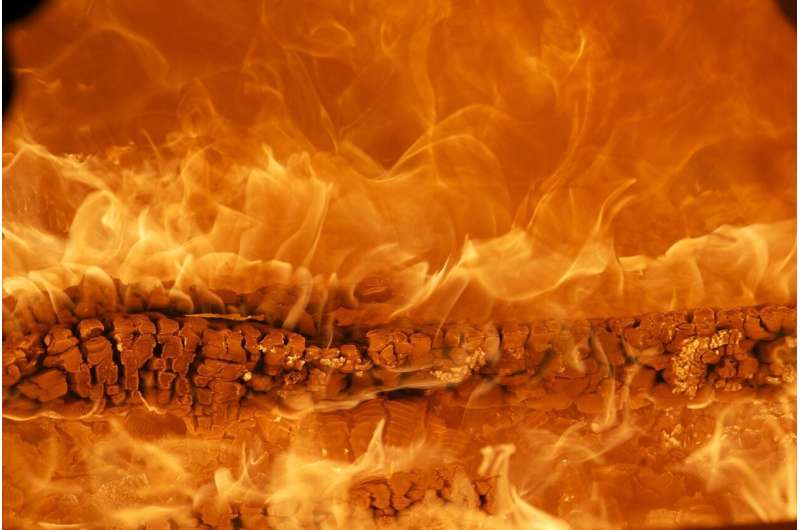Fuel study finds staggering pollution levels in informal settlements in Africa

Researchers looking at fuel use for cooking in Kenya and Malawi have found residents in the countries’ informal settlements are being exposed to worrying levels of pollution.
A team led by Dr. Isabelle Uny from the University of Stirling’s Institute for Social Marketing and Health, measured household air pollution (HAP) in two slums in the East African nations as part of a research project exploring the cultures, behaviors and lived experiences of those who rely on solid fuels—such as wood, biomass waste, charcoal and animal dung—for their cooking needs.
The researchers, who spent two years working on the study, found that in the impoverished communities of Ndirande, Malawi and Mukuru, Kenya, most residents used wood and charcoal for their daily cooking, with plastic bottles, maize stalks and homemade charcoal briquettes, also found to be used as fuel. With householders often cooking in cramped, unventilated spaces, families were found to be exposed to large volumes of dangerous pollution on a daily basis.
Dr. Uny said, “These informal settlements or slums have little infrastructure, and people who are affected by poverty are using whatever fuels they can afford to cook. Solid fuels cause the most damage to health and it’s women– who are often the main cooks—and children who are disproportionately exposed to that household air pollution.”
“We were measuring for PM2.5, which is tiny particles—if you think of the size of a strand of hair, PM2.5 would be much, much smaller. The recommended World Health Organization guidelines state that you shouldn’t be exposed to more than 12.5 micrograms per cubic meter air (μg/m3) of that in a 24-hour period.”
“During this research, when we measured the air pollution around people cooking, we recorded levels as high as, on a daily basis, 600 μg/m3 in Kenya and about 2000 μg/m3 in Malawi. We’re talking about really, really high levels of exposure, to tiny, tiny particles in the air of soot that people are inhaling every day, causing significant harm to their health.”
More than 2 billion people worldwide use solid fuel for their cooking and heating needs and household air pollution (HAP) can be linked to approximately 3.2 million deaths a year—700,000 of which are in sub-Saharan Africa, with HAP linked to diseases including stroke, heart disease, and lung cancer.
Fred Orina, of KEMRI, said, “This was a unique study in that we worked at a grassroots level with communities in order to find out from their perspective what the most pressing issues around using charcoal, wood and other solid fuels for cooking were and the type of solutions they think are the most sustainable, affordable and most feasible to improve air quality and health.”
As part of the research, the academics embedded themselves in the two informal settlements, conducting walking interviews—where the interviewer walks with and films the participant’s journey from sourcing, buying or collecting fuel to preparing the fire or stove and cooking. As part of this research method, video, GPS and air pollution measuring equipment was used to gather data.
The team also used novel research method—’Photovoice’, where a further 20 participants were given camera phones to document their own experiences of fuel gathering, food preparation, cooking and household air pollution over a two-week period.
During the study, one participant told researchers: “You will hear the children complaining ‘smoke, smoke’. It overwhelms me and I even have difficulty in breathing when I light the stove. I get headaches, I am lightheaded.”
Community events
The data and interviews were then translated into a series of posters which were displayed at a number of community events. Researchers also engaged with community leaders, policymakers and local and national government representatives to share their findings.
Limbani Kalumbi, MUBAS, said, “People are being driven to use these fuel sources, not because they want to, but due to issues around household income, access to certain fuels and the availability—or lack of availability—of cleaner sources of fuel.”
“We discussed potential solutions with community members and what they are interested in is better access to cleaner fuels including LPG gas and in the longer term being able to rely on a good, affordable supply of electricity.”
Dr. Uny added, “The need is great. Previous interventions have seen sub-Saharan communities provided with more fuel-efficient stoves, which provides some benefits environmentally but doesn’t improve the health implications suffered from exposure to smoke.”
“We shared our findings through a poster exhibition in Kenya and Malawi and discussed solutions with local people as well as with policy makers and other decision makers, to highlight the issues further and discuss possible ways in which the impact on health of solid fuel use could be improved in line with the aspirations of the Kenyan and Malawian governments.”
Citation:
Fuel study finds staggering pollution levels in informal settlements in Africa (2023, April 28)
retrieved 28 April 2023
from https://phys.org/news/2023-04-fuel-staggering-pollution-settlements-africa.html
This document is subject to copyright. Apart from any fair dealing for the purpose of private study or research, no
part may be reproduced without the written permission. The content is provided for information purposes only.
For all the latest Science News Click Here
For the latest news and updates, follow us on Google News.

